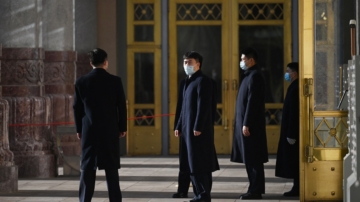【新唐人2013年07月20日讯】中国近来民众抗议事件频发,“广东省社会建设工作委员会”在16号宣布,将会把群体性事件的数量,纳入地方政府政绩考核指标当中。消息一公布,在网路上引起网友热烈讨论。
广东省社工委新的考核办法,考核指标满分为100分,共分为四个部分,分别是社会事业、社会安全、社会公平与社会参与。其中社会事业占比最高,共有39分,其次分别是社会安全占27分、社会公平占18分、社会参与占16分。
每十万人的“群体性事件”数被列入了社会安全的考评板块中,分值为2分,由省公安厅提供资料。每十万人发生群体性事件数量越高,则分值越低。
美国“中国社会民主党”中央委员会主持人刘因全:“我认为广东这样做,就是说明了群体事件已经成为很严重的社会问题,现在我们看到也是这样,群体事件是越来越多了,而且已经成为影响中国社会发展的很重要的一方面。”
分析指出,一旦有考核就会有指标,有指标就能做假,那么到头来又是欺上瞒下。
刘因全:“我相信按照中共官员目前的这种状态,我相信他们会这样做,就是采取更加高压的政策来对待老百姓,这样就更惨了,对老百姓来说,就更苦了。”
原广东《南方人才市场报》副总编朱建国:“因为实际上你要考核,他又压不下去,怎么办呢?他就只能控制媒体,谁在微博上发一个甚么讯息,我就把你当谣言抓起来,最近抓了不少,那这样反过来,它实际上更加剧官民的对立,社会的冲突。”
近年来,广东省的群体性事件频传。2005年12月6号,广东汕尾市东洲镇发生了一次流血冲突事件,由于当地政府在征用土地兴建电厂的赔偿方面,与当地村民产生纠纷,当局动用警力,以暴力手段对付村民,导致村民多人死亡。
2008年11月7号,广东深圳再发生警民冲突。事件起因于警察采用不正当手段执法检查,导致当事人死亡,造成当事人亲友和群众不满,并爆发严重的警民冲突。
2010年下半年,广州市发生一系列捍卫粤语的行动。7月25号,一批广州市民在广州地铁聚集支持粤语,香港《蘋果日报》报导有上万人参加。
另外,2011年6月6号,位于广东潮州市潮安县的古巷镇周围,发生因外来工讨薪事件,但地方当局处理不当且无能,而演变成暴力事件与族群冲突。
事隔几天,位于广东省增城市的新塘镇,6月10号因城管殴打一名摆地摊的孕妇,再引发大规模的群众抗议事件。
同年的12月,广东汕头市海门镇上万民众在镇政府集会,抗议当局在海门建第二座燃煤电厂。据报导,中共武警向示威群众发射催泪瓦斯,并用警棍殴打抗议民众。
广东最具代表性的群体性事件,当属发生在2011年9月的乌坎事件,起因是当地村委会将一块集体土地卖给开发商,几年来在当地居民不知情的情况下,3200亩土地陆续被当局卖出,卖地款项达7亿多元人民币,而发给村民的补助款只有500元,其馀全部被当地官员私吞。
事实上,对于广东当局将群体性事件发生次数纳入官员考核指标,也引起网友的讨论,有网友说,广东多发群体事件的原因是政府失职,无法主持公正,民众不相信当局能够主持正义,所以宁愿私下解决,这也充分暴露当局的无能。
采访/陈汉 编辑/黄亿美 后制/钟元
Number Of Mass Incidents Used As A Performance Indicator
Protests are happening frequently in China these days.
On July 16 Guangdong Provincial Social
Construction Work Committee announced
they were evaluating the number of mass incidents
on local government performance.
This caused a heated debate online.
Guangdong Province new Social Work assessment methods
has a full score of 100 points in assessment indicators.
These are divided into four parts; social undertakings,
social security, social justice and social participation.
Social undertakings have the highest proportion,
with a total of 39 points.
Social Security follows with 27 points, social justice
has 18 points, and social participation has 16 points.
Mass incidents of 100,000 people were included in the
social security evaluation section, with a score of 2 points.
The provincial Police Department should provide information.
The higher the number of mass incidents, the lower the score.
Liu Yinquan of the Chinese Social Democratic Party:
"I think the measures by Guangdong Province show that
mass incidents have become a very serious social problem.
What we see is the same and there are
more and more mass Incidents.
These are an important aspect impacting China's
social development."
Analysis pointed out that once the assessment has indicators,
they could be made up, then in the end it will still be lies to all.
Liu Yinquan: "According to the current state of
Chinese officials,
I believe they will take a high-handed policy towards
people, making them become bitter."
Zhu Jianguo, former deputy editor of Southern Talent Market:
"They want to assess, and press (incidents) down, so what to do?
They only control the media.
If someone sent a message (of incidents) online,
he may be arrested on the charge of starting rumors.
This will exacerbate the opposition of
officials and the public, and social conflicts."
In recent years, Guangdong Province often has mass incidents.
A bloody conflict happened in Dongzhou Town, Shanwei,
Guangdong Province on December 6, 2005.
The local government had a dispute with villagers over land
acquisition compensation for construction of the power plant.
The authorities used the police to violently attack
the villagers, causing many deaths.
Police and locals had conflicts on November 7, 2008 in
Shenzhen, Guangdong Province.
It was caused by the police using improper means of inspection,
leading to the death of the person examining.
With discontent among his relatives, friends and the masses,
there was an outbreak of severe conflicts with police.
In the second half of 2010, a series of actions took place in
Guangzhou to defend Cantonese.
A group of citizens of Guangzhou gathered in Guangzhou
Metro Station to support Cantonese on July 25, 2010.
Hong Kong Apple Daily reported thousands of people attended.
Migrant workers acquiring salary incidents occurred in
Guxiang Town, Chaoan County, Chaozhou, Guangdong Province on June 6, 2011.
Local authorities mishandled it incompetently
and it evolved into violence and ethnic conflict.
After a few days, a city management person beat a pregnant
street vendor, in Xintang Town, Zengcheng, Guangdong
Province on June 10, 2011, again leading to mass protests.
In December 2011, ten thousand people in Haimen town,
Shantou, Guangdong Province gathered at the town hall.
They protested against the authorities building a second
coal-fired power plant in Haimen.
According to reports, the Chinese Communist Party (CCP)
fired tear gas into the crowds, beating protesters with batons.
The most representative mass incident in Guangdong Province
was Wukan incident which occurred in September 2011.
It was caused by a land sale to developers by the
local village committee.
Over a few years, without the knowledge of locals, authorities
sold 3200 mu of land in succession, totaling 700 million yuan.
The villagers only got 500 yuan compensation,
and the rest was misappropriated by local officials.
Guangdong authorities counted the number of mass incidents
as official assessment indicators, fueling discussions online.
Some netizen said the reason Guangdong had many mass
incidents is the dereliction of duty of local government.
The public do not believe the authorities can hold justice,
so privately resolved their issues.
This fully exposed the incompetence of the authorities.
广东省社工委新的考核办法,考核指标满分为100分,共分为四个部分,分别是社会事业、社会安全、社会公平与社会参与。其中社会事业占比最高,共有39分,其次分别是社会安全占27分、社会公平占18分、社会参与占16分。
每十万人的“群体性事件”数被列入了社会安全的考评板块中,分值为2分,由省公安厅提供资料。每十万人发生群体性事件数量越高,则分值越低。
美国“中国社会民主党”中央委员会主持人刘因全:“我认为广东这样做,就是说明了群体事件已经成为很严重的社会问题,现在我们看到也是这样,群体事件是越来越多了,而且已经成为影响中国社会发展的很重要的一方面。”
分析指出,一旦有考核就会有指标,有指标就能做假,那么到头来又是欺上瞒下。
刘因全:“我相信按照中共官员目前的这种状态,我相信他们会这样做,就是采取更加高压的政策来对待老百姓,这样就更惨了,对老百姓来说,就更苦了。”
原广东《南方人才市场报》副总编朱建国:“因为实际上你要考核,他又压不下去,怎么办呢?他就只能控制媒体,谁在微博上发一个甚么讯息,我就把你当谣言抓起来,最近抓了不少,那这样反过来,它实际上更加剧官民的对立,社会的冲突。”
近年来,广东省的群体性事件频传。2005年12月6号,广东汕尾市东洲镇发生了一次流血冲突事件,由于当地政府在征用土地兴建电厂的赔偿方面,与当地村民产生纠纷,当局动用警力,以暴力手段对付村民,导致村民多人死亡。
2008年11月7号,广东深圳再发生警民冲突。事件起因于警察采用不正当手段执法检查,导致当事人死亡,造成当事人亲友和群众不满,并爆发严重的警民冲突。
2010年下半年,广州市发生一系列捍卫粤语的行动。7月25号,一批广州市民在广州地铁聚集支持粤语,香港《蘋果日报》报导有上万人参加。
另外,2011年6月6号,位于广东潮州市潮安县的古巷镇周围,发生因外来工讨薪事件,但地方当局处理不当且无能,而演变成暴力事件与族群冲突。
事隔几天,位于广东省增城市的新塘镇,6月10号因城管殴打一名摆地摊的孕妇,再引发大规模的群众抗议事件。
同年的12月,广东汕头市海门镇上万民众在镇政府集会,抗议当局在海门建第二座燃煤电厂。据报导,中共武警向示威群众发射催泪瓦斯,并用警棍殴打抗议民众。
广东最具代表性的群体性事件,当属发生在2011年9月的乌坎事件,起因是当地村委会将一块集体土地卖给开发商,几年来在当地居民不知情的情况下,3200亩土地陆续被当局卖出,卖地款项达7亿多元人民币,而发给村民的补助款只有500元,其馀全部被当地官员私吞。
事实上,对于广东当局将群体性事件发生次数纳入官员考核指标,也引起网友的讨论,有网友说,广东多发群体事件的原因是政府失职,无法主持公正,民众不相信当局能够主持正义,所以宁愿私下解决,这也充分暴露当局的无能。
采访/陈汉 编辑/黄亿美 后制/钟元
Number Of Mass Incidents Used As A Performance Indicator
Protests are happening frequently in China these days.
On July 16 Guangdong Provincial Social
Construction Work Committee announced
they were evaluating the number of mass incidents
on local government performance.
This caused a heated debate online.
Guangdong Province new Social Work assessment methods
has a full score of 100 points in assessment indicators.
These are divided into four parts; social undertakings,
social security, social justice and social participation.
Social undertakings have the highest proportion,
with a total of 39 points.
Social Security follows with 27 points, social justice
has 18 points, and social participation has 16 points.
Mass incidents of 100,000 people were included in the
social security evaluation section, with a score of 2 points.
The provincial Police Department should provide information.
The higher the number of mass incidents, the lower the score.
Liu Yinquan of the Chinese Social Democratic Party:
"I think the measures by Guangdong Province show that
mass incidents have become a very serious social problem.
What we see is the same and there are
more and more mass Incidents.
These are an important aspect impacting China's
social development."
Analysis pointed out that once the assessment has indicators,
they could be made up, then in the end it will still be lies to all.
Liu Yinquan: "According to the current state of
Chinese officials,
I believe they will take a high-handed policy towards
people, making them become bitter."
Zhu Jianguo, former deputy editor of Southern Talent Market:
"They want to assess, and press (incidents) down, so what to do?
They only control the media.
If someone sent a message (of incidents) online,
he may be arrested on the charge of starting rumors.
This will exacerbate the opposition of
officials and the public, and social conflicts."
In recent years, Guangdong Province often has mass incidents.
A bloody conflict happened in Dongzhou Town, Shanwei,
Guangdong Province on December 6, 2005.
The local government had a dispute with villagers over land
acquisition compensation for construction of the power plant.
The authorities used the police to violently attack
the villagers, causing many deaths.
Police and locals had conflicts on November 7, 2008 in
Shenzhen, Guangdong Province.
It was caused by the police using improper means of inspection,
leading to the death of the person examining.
With discontent among his relatives, friends and the masses,
there was an outbreak of severe conflicts with police.
In the second half of 2010, a series of actions took place in
Guangzhou to defend Cantonese.
A group of citizens of Guangzhou gathered in Guangzhou
Metro Station to support Cantonese on July 25, 2010.
Hong Kong Apple Daily reported thousands of people attended.
Migrant workers acquiring salary incidents occurred in
Guxiang Town, Chaoan County, Chaozhou, Guangdong Province on June 6, 2011.
Local authorities mishandled it incompetently
and it evolved into violence and ethnic conflict.
After a few days, a city management person beat a pregnant
street vendor, in Xintang Town, Zengcheng, Guangdong
Province on June 10, 2011, again leading to mass protests.
In December 2011, ten thousand people in Haimen town,
Shantou, Guangdong Province gathered at the town hall.
They protested against the authorities building a second
coal-fired power plant in Haimen.
According to reports, the Chinese Communist Party (CCP)
fired tear gas into the crowds, beating protesters with batons.
The most representative mass incident in Guangdong Province
was Wukan incident which occurred in September 2011.
It was caused by a land sale to developers by the
local village committee.
Over a few years, without the knowledge of locals, authorities
sold 3200 mu of land in succession, totaling 700 million yuan.
The villagers only got 500 yuan compensation,
and the rest was misappropriated by local officials.
Guangdong authorities counted the number of mass incidents
as official assessment indicators, fueling discussions online.
Some netizen said the reason Guangdong had many mass
incidents is the dereliction of duty of local government.
The public do not believe the authorities can hold justice,
so privately resolved their issues.
This fully exposed the incompetence of the authorities.








